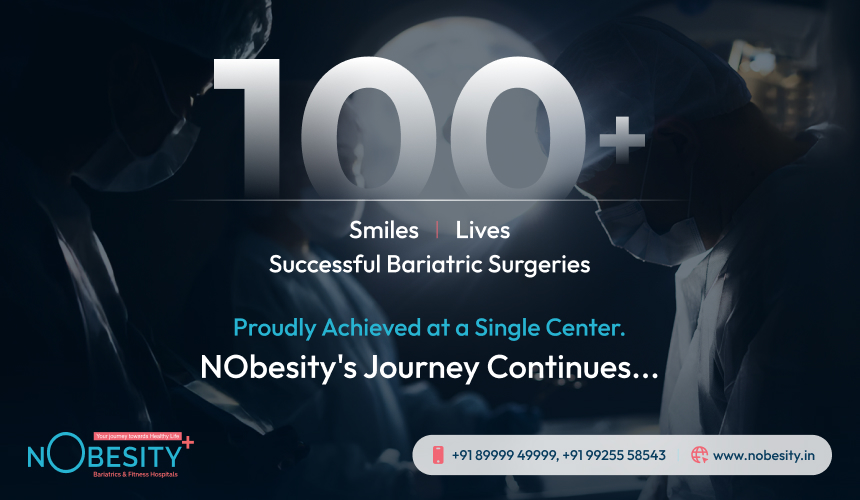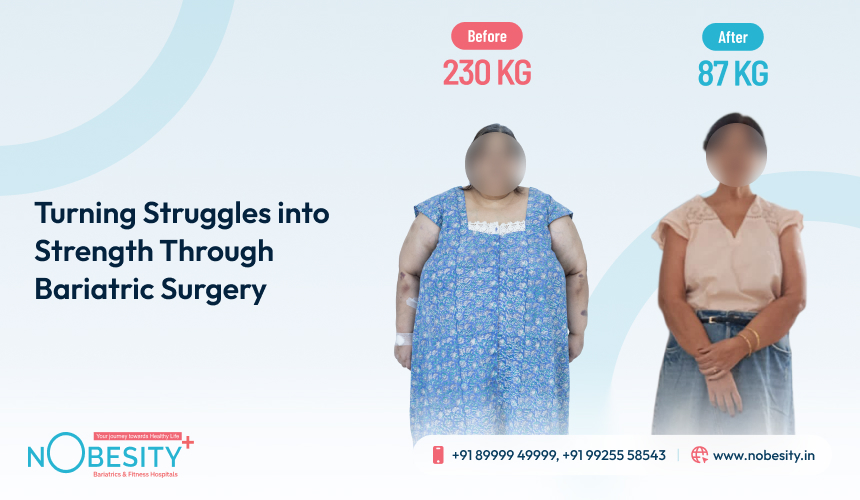
Introduction
Did you know that over 650 million adults worldwide are obese, making obesity one of the most acute health concerns of current time? Beyond the physical hurdles, obesity carries emotional, social, and economic hindrances, leaving millions searching for practical solutions.
Healthy diet plans and regular exercise may seem like the obvious answers, but for many, these methods often fail to deliver lasting results. This raises a critical question: Is there a solution capable of attaining significant weight loss and resolving the broader challenges associated with obesity?
The answer lies in bariatric surgery. It is a cutting-edge intervention that goes beyond helping people shed weight. This blog is for anyone struggling with obesity, considering fat loss operation, or simply curious about the diverse benefits of the surgery.
You’ll discover why this surgical approach is considered a life-changing solution, how it addresses weight loss obstacles that traditional methods cannot, and the extraordinary health benefits it provides beyond fat loss.
Read on to explore how bariatric surgery offers a pathway to not just weight loss but a healthier, more fulfilling life. Let’s dive in!
Understanding Obesity And Weight Loss Solutions
Obesity is more than just a number on the scale—it’s a complex and growing global health challenge. A massive chunk of the world’s adult population contributes to a range of chronic conditions such as diabetes, liver & heart disease, difficulty in breathing, irregular sleeping patterns, and high blood pressure.
For many, obesity isn’t just about overeating; it’s influenced by genetics, hormonal imbalances, and lifestyle factors, making it one of the most challenging conditions to tackle through conventional means.
Common Weight Loss Methods And Their Limitations
Typical paths to weight loss, such as a balanced diet and physical activity, are often the initial steps people take to deal with obesity. While these options can work for individuals with mild weight challenges, they often are insufficient for those battling with morbid obesity or metabolic conditions.
- Dieting: Caloric restriction and trend diets may result in temporary weight loss, but most individuals regain the weight within a year. The yo-yo dieting can even result in more weight gain over time, worsening health problems.
- Exercise: While critical for overall health, exercise alone is rarely enough for substantial weight loss in people with obesity. For individuals struggling with joint pain, fatigue, or other weight-related issues, maintaining a regular exercise schedule can feel like an impossible task.
The Emergence Of Bariatric Surgery As A Transformative Solution
Unlike dieting and exercise, bariatric surgery directly addresses the core causes of obesity by modifying the digestive system to reduce frequent hunger signals and strengthen metabolism.
It’s not just a quick fix; it’s a scientifically backed solution proven to deliver lifelong benefits and enrich overall health.
Obesity surgery offers hope and a tangible path toward lasting transformation for individuals who’ve tried and failed with orthodox routes.
Key Takeaway: Obesity is a complex condition often resistant to traditional methods like well-balanced diet and exercise. Bariatric surgery provides a transformative solution by targeting the root causes, offering sustainable weight loss and improved health outcomes.
Why Traditional Weight Loss Methods Often Fail
Losing weight is a goal for countless individuals, but the journey is often filled with challenges. For individuals dealing with obesity, time-honored approaches like dieting and exercise frequently fall short of delivering sustainable results.
Here’s why these techniques are often inadequate and leave people feeling frustrated and demoralized.
Challenges Of Long-Term Adherence To Dieting And Exercise
Dieting requires consistent effort, discipline, and often drastic lifestyle changes. While some individuals may see initial success, many regain weight within a year. Strict dieting plans are tough to follow long-term, and the constant restriction can result in feelings of distress and burnout.
Similarly, exercise, though essential for health, demands consistency and energy.
For individuals with obesity, engaging in high-intensity workouts can be physically burdensome and even painful due to complications like joint pain or fatigue. This makes it problematic to maintain an active routine, leading to uneven results.
Biological Factors Making Sustained Weight Loss Difficult
The human body has mechanisms to protect against starvation, making sustained weight loss challenging. When you lose weight through dieting, your metabolism often slows down, making it harder to continue shedding further.
Hormonal changes can increase hunger and decrease the body’s ability to burn calories efficiently, creating a cycle of weight regain.
Emotional And Psychological Barriers To Dieting Success
Weight loss is not just physical—it’s deeply tied to emotional and psychological well-being. Stress, anxiety, and depression often accompany obesity, and standard techniques rarely tackle these factors.
Emotional eating, a common coping mechanism, can hinder progress made through dieting. Furthermore, the stigma surrounding obesity can lead to feelings of isolation, making it more tough to seek help or stay motivated.
Key Takeaway: Traditional weight loss methods like dieting and exercise often fail due to physical, biological, and emotional challenges. For individuals with obesity, these barriers highlight the need for more comprehensive and sustainable solutions.
Effectiveness Of Bariatric Surgery For Weight Loss
For individuals struggling with obesity, bariatric surgery offers a solution that goes beyond weight loss—it addresses the source reasons for the condition and provides decade-long results. Unlike commonly adopted practices, which often lead to temporary success, weight loss treatment is designed to create lasting transformation.
How Bariatric Surgery Addresses The Root Causes Of Obesity
Fat loss surgery alters the digestive system to lessen food intake, overcome frequent hunger, and improve the body’s ability to process nutrients. Bariatric procedures decrease stomach capacity and impact hunger hormones.
By treating biological factors that contribute to weight gain, obesity surgery helps patients overcome hurdles that orthodox techniques cannot resolve.
Scientific Evidence Supporting Its Long-Term Effectiveness
Studies show that obesity surgery leads to significant and sustained weight loss for most patients. Research indicates that individuals who undergo bariatric procedures lose approximately 50-70% of their surplus weight within the first year and maintain this progress over decades.
Additionally, fat loss surgery has been proven to partially or wholly cure obesity-related health risks, such as type 2 diabetes and heart disease, offering patients a new life.
Success Stories Of Individuals Achieving Sustainable Weight Loss
Bariatric surgery has proven to be the best tool for countless individuals struggling with obesity and related concerns. Patients undergoing obesity operations at NObesity have revitalized their lives beyond the physical changes. Many have experienced:
- Increased self-confidence, enabling them to pursue career goals and personal aspirations.
- Increased range of motion, allowing them to participate in activities they once avoided.
- Relief from obesity-related health conditions, such as joint pain and hypertension.
- Better emotional health, with reduced anxiety and depression.
- Control over overeating habits, leading to a more balanced and healthier lifestyle.
The joy of living an active life, reconnecting with hobbies, and spending quality time with loved ones.
These personal milestones highlight the profound physical, emotional, and mental changes fat loss surgery can bring, helping patients regain control of their lives. Check out patients’ success stories here.
Key Takeaway: Bariatric surgery is a scientifically proven solution that partially or even completely resolves the root causes of obesity. The result is significant and sustainable weight loss while enriching overall health, emotional well-being, and quality of life.
Common Misconceptions About Bariatric Surgery
Bariatric surgery is often misunderstood, leading to widespread myths and misbeliefs that can discourage people from exploring this life-changing opportunity. Let’s answer some of the most common myths and shed light on what obesity surgery truly involves.
“It’s the Easy Way Out” And Other Myths Debunked
One of the most persistent myths about bariatric weight loss surgery is that it’s the “easy way out” for weight loss.
In reality, the surgery is just the beginning of a transformative journey. It requires dedication to new eating habits, consistent physical activity, and mental health support to achieve and sustain success.
While the procedure provides a powerful tool for weight loss, patients must adopt healthy lifestyle changes to maintain their progress.
Other common myths include:
- “Bariatric surgery is only for vanity.” The surgery primarily alleviates severe obesity and its related health risks, such as diabetes and cardiovascular disease. It’s a medical necessity for many.
- “You can’t enjoy food after surgery.” While portions are smaller, patients often rediscover the joy of eating mindfully and focusing on nutrition.
Addressing Fears About Risks And Complications
Like any surgical procedure, bariatric surgery carries risks, but progressions in medical technology have significantly improved its safety. The risks of remaining obese, including life-threatening conditions like cardiovascular disease, often outweigh the risks of surgery.
Comprehensive pre-surgery evaluations and follow-up care make obesity operations a safe and practical option for attaining long-term health betterment.
Clarifying Who Qualifies For Bariatric Surgery
Fat loss surgery isn’t for everyone. It’s typically recommended for individuals with a BMI of 35 or higher or those with a BMI of 30+ and obesity-related health disorders. A detailed medical assessment by a qualified healthcare professional helps determine whether surgery is a viable option.
Key Takeaway: Bariatric surgery is a safe and excellent option for managing severe obesity. Patients can make informed decisions about this revolutionary solution by debunking myths, overcoming fears, and clarifying eligibility.
5 Health Benefits Of Bariatric Surgery Beyond Weight Loss
Bariatric surgery is not just about getting rid of surplus weight—it’s about reclaiming health and enriching quality of life. Beyond substantial weight loss, the procedure offers a range of health benefits that transform lives physically, emotionally, and mentally.
Improvement In Sleep Apnea
Obstructive sleep apnea is a familiar issue among individuals with obesity. Fat loss surgery helps reduce fat residues around the neck and throat, improving airflow and lessening or eliminating apnea seizures.
Patients often experience a phenomenal enhancement in sleep quality, with many lowering or wholly mitigating their dependency on CPAP machines within a few months after the operation.
Type 2 Diabetes Remission
For individuals with type 2 diabetes, obesity treatment has been a game-changer. The surgery significantly improves insulin sensitivity by altering hormones that regulate blood sugar.
Hence, many patients experience remission or substantial betterment in diabetes-associated symptoms, lessening the need for medications.
Relief From Joint Pain And Enhanced Mobility
Excess weight puts immense strain on joints, leading to chronic pain and restricted physical limitations. Bariatric surgery alleviates this limitation and strengthens body movement, allowing individuals to participate in physical activities actively.
Improved Fertility And Reproductive Health
For individuals facing obesity-related fertility challenges, weight loss treatment can be revolutionary. By balancing hormones and relieving complications like polycystic ovary syndrome (PCOS), the procedure enhances fertility.
Additionally, improved overall health increases the odds of healthy pregnancies.
Positive Impact On Mental Health And Life Quality
Obesity often affects emotional well-being, leading to stress, anxiety, and depression. After fat loss surgery, patients frequently report better self-esteem, boosted confidence, and a more positive life viewpoint.
Rediscovering activities they once avoided—whether playing with children, traveling, or pursuing hobbies—further enriches their mental health, restoring joy and happiness in everyday life.
Key Takeaway: Bariatric surgery delivers benefits far beyond weight loss, from reversing health conditions like diabetes and sleep apnea to the ability to move without discomfort, fertility, and mental well-being, offering patients a renewed sense of vitality and quality of life.
Comparing Bariatric Surgery With Dieting: Which Is Better?
When it comes to attaining lifelong weight loss, many wonder if bariatric surgery is genuinely superior to traditional dieting. While both approaches have their merits, obesity surgery offers distinct advantages, especially for individuals dealing with severe obesity and related health complications.
Side-By-Side Comparison Of Outcomes
- Weight Loss Sustainability: Dieting often leads to temporary weight loss, with many individuals regaining weight within a year. In contrast, studies show that obesity surgery helps patients lose 50-70% of their surplus weight within the 12 months after operation, with most maintaining long-standing results.
- Health Benefits: While dieting can bolster overall health, its impact is often confined to those with conditions like diabetes or disturbed sleeping cycles. Fat loss surgery, on the other hand, has been proven to lessen or even resolve such ailments significantly.
- Emotional And Psychological Impact: Dieting often requires determination and ongoing effort, leading to frustration and burnout. Bariatric surgery, connected with lifestyle adjustments, helps patients build confidence, reduce anxiety, and adopt a healthier mindset toward food and body appearance.
Surgical Approach Benefits For Morbid Obesity
Fat loss surgery is often the most practical solution for individuals with a BMI of 35 or higher. It directly treats the biological, hormonal, and metabolic factors contributing to obesity, offering a holistic approach that dieting alone cannot accomplish.
When And Why Bariatric Surgery Is Recommended Over Dieting
Bariatric weight loss surgery is recommended for individuals who have tried and failed with orthodox fat loss techniques or those with obesity-related health disorders. It provides a medical pathway to lifelong weight loss, especially for people whose weight poses significant risks to their overall health.
Key Takeaway: While dieting is valuable for general health, bariatric surgery offers a comprehensive and sustainable solution for severe obesity, addressing both physical and emotional challenges while delivering long-term health benefits.
Post-Bariatric Surgery: Building A Healthier Lifestyle For Long-Term Success
Bariatric surgery is a powerful starting point for weight loss, but the journey to lifelong success depends on adopting a healthier lifestyle that nurtures both the body and mind.
Post-treatment, individuals must focus on dietary changes, emotional well-being, and physical activity to maintain achieved results and enrich their overall quality of life.
Practical Dietary Tips For Sustained Results
Post-surgery, the digestive system undergoes substantial changes, requiring a careful approach to eating. Here are some essential dietary tips:
- Smaller Portions: Since the stomach’s capacity is reduced, eating smaller, nutrient-rich meals is paramount.
- Chewing Thoroughly: Proper chewing helps the digestive system process food more systematically.
- Prioritize Protein: Lean proteins are beneficial for healing and help maintain muscle mass during fat loss.
- Stay Hydrated: Drinking ample water throughout the day supports metabolism and overall health.
- Avoid Sugary And Processed Foods: These can hinder fat loss and cause discomfort post-operation.
Emotional Well-Being And Mental Health Post-Surgery
The emotional aspect of post-bariatric surgery life is often ignored, but it’s vital for long-term success.
- Counseling And Support Groups: Seeking professional counseling or attending support groups offered by NObesity can help overcome emotional challenges and foster a sense of community.
- Self-Compassion: Celebrate small victories and avoid being overly negative about setbacks.
- Practice Mindful Eating: Cultivate a healthier relationship with food and gain control of emotional eating.
Incorporating Exercise And Building Healthier Habits
Physical activity plays an integral role in supporting weight loss and overall fitness.
- Start Slowly: Commence with low-impact activities such as brisk walking or swimming, gradually increasing intensity.
- Set Realistic Goals: Create achievable fitness milestones to stay motivated.
- Consistency Is Key: Aim for regular activity to build endurance and enhance metabolism.
Key Takeaway: Life after bariatric surgery requires dedication to healthier habits, including balanced eating, emotional well-being, and regular exercise. These lifestyle adaptations ensure long-term success and a vibrant, active life.
Conclusion
Bariatric surgery stands out as an outstanding solution for individuals facing severe obesity, offering far more than dieting or exercise can achieve.
Unlike standard weight loss methods, which often result in short-lived outcomes, obesity surgery works on the biological, emotional, and psychological factors that contribute to obesity.
It not only helps patients shed considerable weight but also delivers lifelong health benefits, such as reversing type 2 diabetes, improving sleep cycles, and enhancing body movement and mental well-being.
Success after the obesity operation demands commitment. Patients must adopt healthier eating habits, exercise regularly, and seek emotional support to support their progress. Building a sustainable lifestyle post-treatment is key to unlocking its full potential as a holistic solution.
If you’re considering bariatric surgery, choosing a trusted center is crucial. You can approach NObesity, where we combine expert surgical care with comprehensive post-operative support, including personalized diet plans, psychological counseling, and professional guidance to ensure lasting success.
Based in Ahmedabad, we’re devoted to helping individuals reclaim their health, self-esteem, confidence, and quality of life through safe, effective weight loss solutions.
Take the first step toward a healthier, more vibrant life by consulting a bariatric surgeon today. With the proper care and guidance, lasting transformation is not just possible—it’s within your reach.








